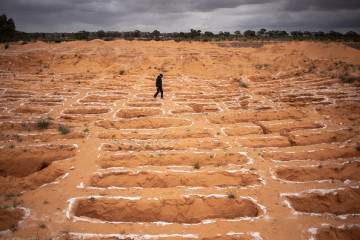

Alongside fighting the new variant of the coronavirus, hospitals in southern Libya are facing another epidemic: unidentified bodies filling up their morgues.
The crisis has been building in a number of Libyan hospitals as the country attempts to recover from a civil war that has engulfed most of its cities and regions.
A recurring problem
Last week Hassan Al-Zaruk, the director of the ‘House of Mercy’ hospital in Sabha Medical Centre in southern Libya, said that, “the refrigerators for storing bodies in the hospital are filling up with unidentified bodies, and this is a problem which has come up repeatedly in recent years”.
He announced in a statement published by the hospital's media office that the mortuary refrigerators contain 22 bodies that are unidentified, and were nearing their maximum capacity of 36. Moreover, some of the bodies have been in the freezers for several months.
"Most of the bodies are migrants who died whilst trying to cross the desert to reach northern Libya, or who have been killed by people smuggling gangs"
Al-Zaruk warned: “The longer these corpses remain here, the bigger the potential for our staff to be infected with disease, especially since some of the bodies are in a state of decay”.
Hospitals refuse to receive more bodies
He made it clear that the mortuary was refusing to receive any new bodies from the security services, who habitually bring the bodies of their personnel who have been killed as well as those they find in the desert. He states that this is a necessary measure because the hospital has entered a state of emergency due to the spread of the epidemic, especially in southern Libya.
“This is not the first time - last October the Sabha Medical Centre supervised the burial of 28 unidentified bodies over three days, with the help of local families and civil institutions. The crisis is all the more urgent because the disinfection process for the mortuary refrigerators takes days – and if the corpse is decomposing then we have to leave the refrigerators empty for weeks”.
Al-Zaruk says that attempts have been made by the centre and the Libyan authorities to address the issue with consulate representatives from African countries to discuss the possibility of transporting the bodies to their original countries.
|
|
“But these attempts have failed every time due to the fact that the bodies are unidentified, and it is impossible to know which countries they came from, as there are no identification records papers of any kind”.
Migrants killed by smuggling gangs
Ramadan Shabani, an officer in the Directorate for Combating Illegal Migration, confirms that most of the bodies are migrants who died whilst trying to cross the desert illegally to reach northern Libya, or who have been killed by people smuggling gangs.
“The Directorate organised a team which was tasked with burying the bodies after they had been stored for a long time in hospital mortuaries. This was after the security services failed to come to a decision of what to do about the issue due to ignorance of the identities”.
He adds: “Some of these teams were forced to seek assistance from private institutes and Ministry of Health offices in their areas in order to bury the bodies so it was not just them shouldering the responsibility and this included documenting what was done with the bodies and having this certified by each party as proof”.
"Gangs also exploit the situation of these immigrants by forcing them to do illegal work for them like stealing electricity cables: they make the migrants cut them…we have found many dead bodies under electrical pylons"
Southern Libya in particular has long suffered severe instability, which has allowed people smuggling to thrive. The smugglers often throw the bodies of those who die during their journey north into the desert.
However, Al-Zaruk indicates that this is not the only way people are dying: “Gangs also exploit the situation of these immigrants by forcing them to do illegal work for them like stealing electricity cables: they make the migrants cut them…we have found many dead bodies under electrical pylons”.
The issue of overcrowding in the hospital morgues is not limited to unidentified migrants. Deaths from coronavirus have also exacerbated the situation, leading hospitals to seek help. Last week, the Committee to Combat Covid-19 in Zawia issued an emergency call asking the city's residents to retrieve the bodies of their relatives who had died from the virus, even while acknowledging the high risks of infection.
In Zintan the medical isolation centre requested help from the municipality to assist with burying those who have died from the virus because its mortuary has filled to capacity.
Dr. Mahy Al-Din Abdullah, who works in a medical centre in Tripoli considers it essential that efforts are combined to come up with solutions to the overwhelming numbers of bodies in the mortuaries, because it is presenting an emergency for the entire country – “whether these are the bodies of covid victims, undocumented migrants, or those who have been found in the mass graves which have been discovered in some parts of the country”.
This is a translation from our Arabic edition. To read the original article click here.
Article translated by Rose Chacko





 Follow the Middle East's top stories in English at The New Arab on Google News
Follow the Middle East's top stories in English at The New Arab on Google News


